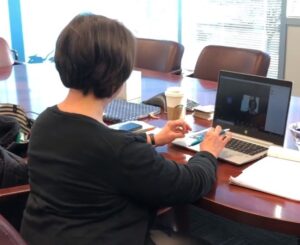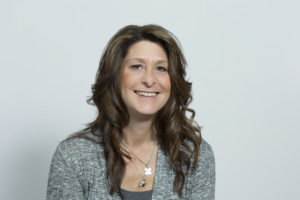The Les Turner ALS Foundation’s Support Services Team often serve as the first point of contact for a person recently diagnosed with ALS and their families to help chart a path forward to address their immediate and future needs and concerns. On the front lines providing this high-level of support and service coordination are Easton Stevenson, LCSW, and Cara Gallagher, MA, LCPC, who have worked for the Foundation as ALS support service coordinators since 2013 and 2016 respectively. Over that time, they have assisted hundreds of individuals and families navigate the challenges brought upon by ALS through a personalized approach, utilizing their years of expertise to develop a care plan that best fits the person’s needs and desires.
 During the past year’s COVID-19 pandemic the entire Support Services Team shifted how they deliver services from in-person to virtual. For Easton and Cara, this presented some challenges as well as opportunities to engage with their clients in different ways. They both took some time to discuss the transitions and their passion for helping others.
During the past year’s COVID-19 pandemic the entire Support Services Team shifted how they deliver services from in-person to virtual. For Easton and Cara, this presented some challenges as well as opportunities to engage with their clients in different ways. They both took some time to discuss the transitions and their passion for helping others.
Q: For an individual diagnosed with ALS, what are the first steps you counsel them and their families to take to make a very difficult situation more manageable?

Photo by Rich Chapman
Easton: To seek out information, resources and guidance from only professional/accredited sources and to rely on family, friends and professionals to support and assist you. Allow yourself time to process feelings about the situation but also strive to balance your life with recreational activities, social time with friends and family, and experiencing positive feelings.
Cara: It is important to focus on the here and now just as much as it is to plan for the future. I encourage people to live their lives and do the things that they want to do. Quality of life is such an important component in navigating this disease. Most of all, I encourage people to continue to be themselves and not let their diagnosis define them.
Q: What has been the biggest adjustment that you have had to make since last March when the pandemic started and everything was moved to virtual?

Photo by Rich Chapman
Cara: I know the value in face-to-face interactions with people living with ALS and their families. I was concerned that I might not be able to establish the same level of rapport using alternate modes of communication and I worried that I would not be as effective in really forging a strong relationship. Fortunately, that hasn’t been the case, actually it has been quite the opposite.
Easton: The biggest adjustment for me has been not being able to spend time with people living with ALS and their families in person. I am a people person, and it has been difficult to not be in the same room as those who I am supporting, but instead, hearing their voice via phone, seeing their face on Zoom, or seeing their words on text or email. Being able to be together in person has so many benefits. However, I am so glad that we can continue to provide our supportive services, even remotely, during such a difficult time.
Q: What have been the silver linings to your work during the pandemic?
Easton: One of the silver linings during the pandemic is that I have had my job to focus on — a job that is familiar, rewarding and motivating during such an unsure time. In addition, I have been much more productive during this time (i.e., less time spent traveling from home to home), supporting a greater number of individuals living with ALS as well as growing the support group program.
Cara: I have been able to “see” and be more available to people. The pandemic has made way for more time to dedicate to the needs of the individuals that I serve.
Q: What do you enjoy most about your job and what drives you every day?
Cara: I enjoy getting to know the families and they allow me into their intimate space. ALS is not an easy diagnosis to navigate for the person or the family. The ability to assist and make a difference in people’s day-to-day lives, whether it is emotional support, finding a resource that eliminates a current challenge or experiencing the strength and determination of the people I support, helps fill me with a sense of hope and this drives me to work harder for them.
Easton: What I enjoy most is meeting with and developing a connection with people who are living with ALS and their families by providing them with support, guidance and information during such a difficult time in their lives. I am driven by the fact that I have this opportunity to follow my passion by being there for people during their most challenging time and helping them to have some control during a time that they feel the most powerless.
The Foundation’s Support Services Team are available at no cost to people living with ALS, their families and caregivers who reside in the Foundation’s service area, which includes, Chicago and its surrounding communities as well as portions of northwest Indiana. For more information about the services offered, please click here or visit lesturnerals.org.

